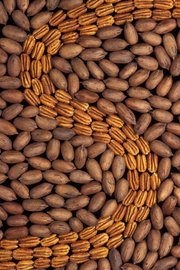Pecan
|
|
| Pecan Conservation status: Secure | ||||||||||||||
|---|---|---|---|---|---|---|---|---|---|---|---|---|---|---|
| Missing image Pecan_orchard.jpg Pecan orchard at Lyndon B. Johnson National Historical Park, Texas | ||||||||||||||
| Scientific classification | ||||||||||||||
|
The Pecan Carya illinoinensis is a species of hickory native to southeastern North America from southern Iowa and Indiana south to Texas and Mississippi. It is a deciduous tree, growing to 25–40 m in height, and can be grown approximately from USDA hardiness zones 5 to 9, provided summers are also hot and humid.
The leaves are alternate, 40–70 cm long, and pinnate with 9–13 (rarely up to 17) leaflets, each leaflet 5–12 cm long and 2–6 cm broad. The flowers are wind-pollinated catkins, and are self incompatible, so two or more wild trees or different cultivars must be present to pollenize each other. The fruit is an oval to oblong nut, 2.6–6 cm long and 1.5–3 cm broad, dark brown with a rough husk 3–4 mm thick, which splits off at maturity to release the thin-shelled nut.
The nuts of the Pecan are edible, with a rich, buttery flavor. They can be eaten fresh or used in cooking, particularly in sweet desserts but also in some savory dishes. One of the most common desserts with the pecan as a central ingredient is the pecan pie, a traditional southern U.S. recipe. In addition to the pecan nut, the wood of the pecan tree is also used in making furniture, in hardwood flooring, as well as flavoring fuel for smoking meats.
The Pecan is the state tree of Texas. Texas is also the leading producer of pecan nuts in the United States, followed by Georgia, Alabama, Louisiana and Oklahoma. Outside the United States, pecans are grown in Australia, Brazil, Israel, Mexico, Peru and South Africa.
The scientific name is commonly misspelled "illinoensis".
External links
- Flora of North America: Carya illinoinensis (http://www.efloras.org/florataxon.aspx?flora_id=1&taxon_id=210000185)
- National Center for Home Food Preservation - Home Preservation of Pecans (http://www.uga.edu/nchfp/publications/nchfp/factsheets/preservingpecans.html)de:Pekannuss

